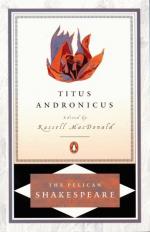|
This section contains 7,312 words (approx. 25 pages at 300 words per page) |

|
SOURCE: Danson, Lawrence N. “The Device of Wonder: Titus Andronicus and Revenge Tragedies.” Texas Studies in Literature and Language 16, no. 1 (spring 1974): 27-43.
In the following essay, Danson contends that as in the great Elizabethan dramas that followed it, the supreme tragic action in Titus Andronicus is not revenge but the formalization of death.
The proliferation of generic categories for Elizabethan drama is a problem as ancient as Polonius' naming of the parts: “tragedy, comedy, history, pastoral, pastoral-comical, tragical-historical, tragical-comical-historical-pastoral, scene individable, or poem unlimited.” One firmly entrenched category is that of the tragedy of revenge, which (according to Fredson Bowers) “has been classified as a definite, small subdivision of the Elizabethan tragedy of blood”; plays belonging to that category “treat, according to a moderately rigid dramatic formula, blood-revenge for murder as the central tragic fact.”1 But the rigidity of the formula is, in fact, questionable. Indeed a striking...
|
This section contains 7,312 words (approx. 25 pages at 300 words per page) |

|


